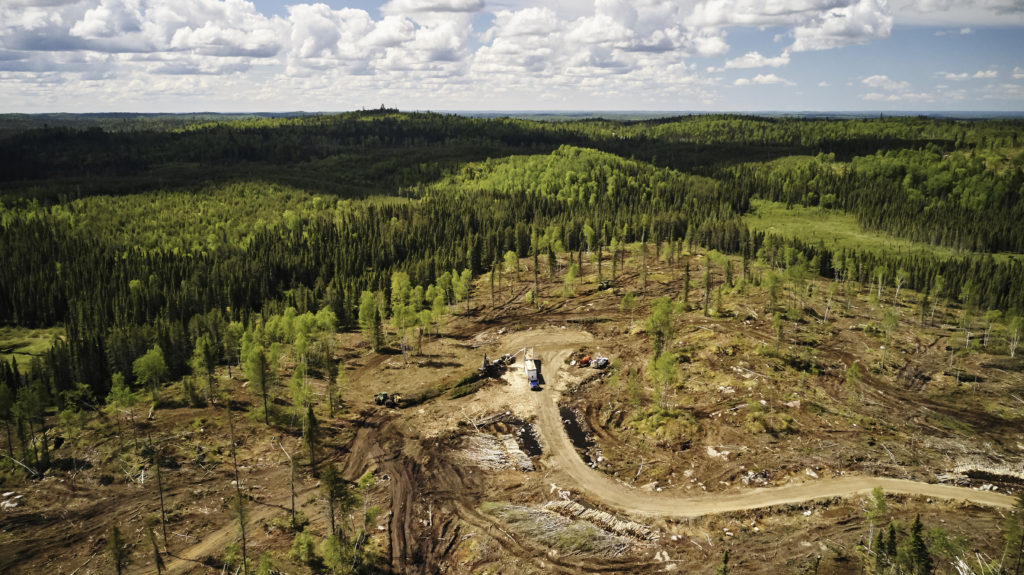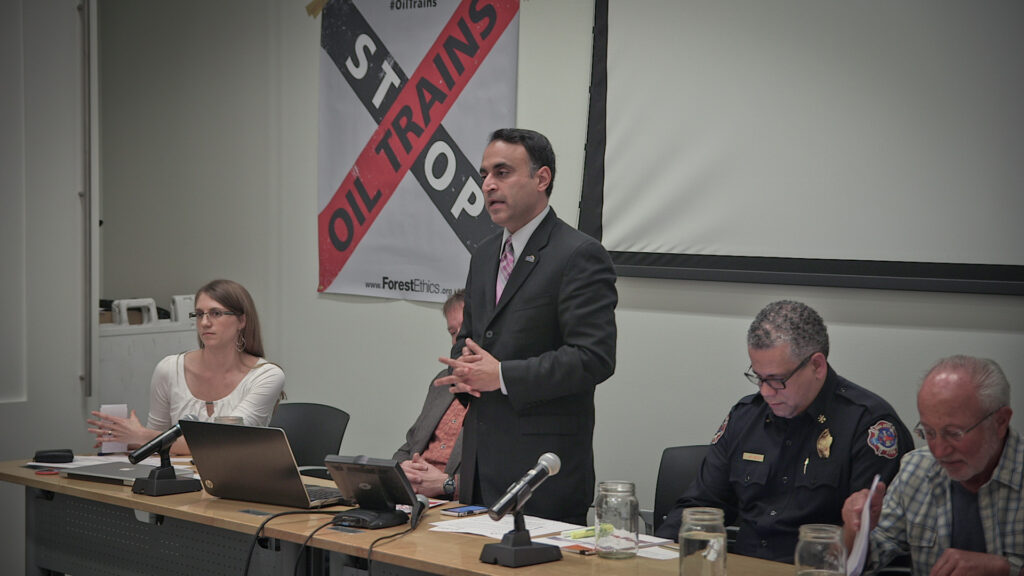
Bill 5: a guide to Ontario’s spring 2025 development and mining legislation
The public has a few days left to comment on Doug Ford’s omnibus development bill....
In late May, California’s legislature passed a groundbreaking bill that would ensure any forest products purchased by the state guarantee free, prior and informed consent from Indigenous communities and do not contribute to the degradation or deforestation of intact boreal forests.
“Protecting the world’s remaining intact forests is necessary to address the climate and biodiversity crisis,” Ash Kalra, California Assembly Member and lead author of the proposed legislation, told The Narwhal in an interview. Kalra explained the bill would set a precedent for ensuring transparency and added it “focuses attention rightly on the scientific imperative to protect both boreal and tropical intact forests.”
The bill is currently with the state’s senate and, if approved by the senate and the governor, will become law in October.
Canadian forestry companies can obtain third-party certification to adhere to those values, but according to David Flood, chair of the Forest Stewardship Council and member of the Matachewan First Nation in Ontario, few companies operating in western Canada have signed on to the new forest standards certification, which requires companies to obtain consent from Indigenous communities before logging on their territories.
“You don’t have FSC certification in northern B.C. and northern Alberta,” he said in an interview. “Well, [companies] have to take a deep belly button look, if their markets include [selling their products in states like California].”
Canadian government and industry representatives have both said the proposed California legislation is unnecessary and could be detrimental to the industry.
On April 21, Yves Beaulieu, Canada’s representative to the state of California, wrote a letter of opposition to the bill on behalf of the government of Canada, stating the bill’s inclusion of Canada’s boreal forests “targets one of California’s most responsible, secure and reliable suppliers of forest products.” Beaulieu argued that Canada is a global leader in sustainable forest management and noted that in 2020 alone, Canada supplied the state with approximately $950 million of forest products.
But, it’s not clear which forestry operations would be directly impacted by the legislation. Industry groups and government officials declined to say if they were aware of any examples.
The Forest Products Association of Canada, an industry trade group representing wood, pulp and paper producers, suggested the legislation would cause more harm than good.
“California and Canada share common interests in building back a post-pandemic economy that’s greener and more inclusive. This bill stands in the way of that,” the association said in a statement provided to The Narwhal. “It presents unintended consequences that will drive costs up for Californians who are already facing an affordability crisis and puts Canadian jobs at risk.”

The association explained that the U.S. lumber industry only meets about 75 per cent of its domestic demand and restricting supply from Canada would have economic impacts on both sides of the border. “It relies on imports from trusted trading partners and Canada is close in proximity and provides a high quality product that is a well-regarded and sought after building material. If not from Canada, where from?”
Jennifer Skene, natural climate solutions policy manager with Natural Resources Defense Council, told The Narwhal the letter from Beaulieu suggests the federal government appears to be confused about what the bill is proposing.
“It basically says that as of 2021, you can no longer be betting against the wishes of Indigenous Peoples and you can no longer be cutting down or sourcing from climate critical forests,” she said in an interview. “The argument coming out around, ‘We’re so sustainable so we’re opposing what’s included in this bill’ doesn’t really make any sense.”
Skene said the consul’s arguments were echoed in letters to the California legislature by the governments of Alberta, Quebec and Ontario.
Lama Khodr, spokesperson for Global Affairs Canada, said Canada is working with provinces and industry to express concerns to the California government.
“Canada’s forest laws are among the most responsible and strict in the world, and we collaborate closely with Indigenous Peoples on forest management,” she told The Narwhal in an email. “We will always vigorously defend the interests of our softwood lumber industry and the hundreds of thousands of good, middle-class jobs for workers it supports across the country.”
Graham Saul, executive director of Nature Canada, told The Narwhal in an interview he was embarrassed and puzzled by the response.
“I find it unfortunate that the federal government is spending its time fighting legislation that is designed to protect forests and honour and respect Indigenous Rights,” he said in an interview. “The boreal forest is a global and national treasure from the perspective of addressing the twin crises of species collapse and climate change and it’s at the heart of our ability to make meaningful progress on reconciliation and Indigenous-led conservation. It’s hard to imagine two issues that are more important right now.”
Canada’s boreal blankets most of the country, stretching thousands of kilometres from the Atlantic coast to the Yukon/Alaska border and beyond. The vast region, which represents about 25 per cent of the world’s forests, is home to thousands of species of plants and animals, including endangered caribou and other at-risk species, and stores about twice as much carbon per hectare as the Amazon rainforest. About 80 per cent of Canada’s boreal forests are intact.
B.C.’s management of old-growth logging and its relationship with Indigenous Peoples has dominated recent headlines, accompanied by images of giant trees and blockaders camped in iconic coastal rainforest, but industrial logging in the boreal looks somewhat different.
Boreal forests are subject to frequent natural disturbances, such as wildfires, and because they exist in colder climates, the trees themselves are smaller than their southern coastal cousins, which means they’re often logged to produce products like pulp and paper.
“A lot of the logging from Canada is exported in low-value products, such as pulp, and more and more consumers are weighing in that they want to have products that come from a company that has a social licence to do its resource extraction activities,” Rachel Plotkin, boreal project manager with the David Suzuki Foundation, told The Narwhal in an interview.
For Kalra, social responsibility was the genesis of the proposed legislation.
“We have to recognize California being the fifth largest economy in the world, our power as consumers and our state procurement as a massive consumer of commodities,” he said. “What role are we playing right now in contributing to the crisis if we do nothing?”

He added the intent is not to target specific jurisdictions — it’s about acknowledging the importance of the issues and taking action.
“California has a long history of climate leadership. My goal is certainly not to focus on any individual country, but rather on the conduct of Californians and what role and voice we have to impact the conduct happening here and around the world.”
The wording of the bill makes a careful distinction when defining which forests are off-limits, noting that an intact forest is one “that has never been industrially logged and has developed following natural disturbances and under natural processes, regardless of its age.”
Skene said this distinction is important in preserving what has been described by some environmentalists as “one of the last great conservation opportunities.”
“Oftentimes industry will paint dynamics in northern forests as different from more southern and tropical forests, because ostensibly [boreal] forests are being replanted,” she said. “But what this legislation really recognizes is that once those intact forests are gone, they’re gone.”
Kalra explained the proposed legislation would leave the two-thirds of Canada’s managed forests already impacted by human activity open for business.
“The reality is that if Canada does have sustainable practices, then they wouldn’t need to go into those intact areas,” he said.
The industry trade group argued the definition of intact forest is vague and broad. “In a nutshell, it would cover any natural forest not harvested before,” the association wrote, adding the Canadian forestry industry is operating on a 150- to 200-year timescale, which means it will need to log intact forests for decades. “This is a testimony to our long-term planning and sustainable practices and the fact that we harvest less than 0.5 per cent of our forests per year.”
Plotkin said while the industry narrative maintains that Canadian forestry is sustainable, the public is becoming increasingly suspicious.
“It’s really easy for provinces or for Canada itself to say that all of our products are sustainable but more and more people are starting to apply critical thinking and looking at things like ‘is the habitat of species at risk degraded by logging in the boreal forest?’,” she said.
For example, woodland caribou, which rely on huge tracts of intact boreal forests, are listed as threatened under Canada’s species-at-risk legislation, and the impacts of logging increasingly imperil the species’ ability to survive.
Flood said the real power behind the legislation and third-party certification is the public.
“The whole premise of certificate systems is it’s market driven. What do the consumers want? From an Indigenous worldview, the world is becoming more Indigenous in stewardship and thought.”
Kalra said he sees this legislation as an opportunity, for both California and Canada alike.
“As much as we want to make sure we’re not contributing to more nefarious practices on deforestation, particularly in some of the tropical areas of the world, we also want to ensure that we encourage protecting the intact boreal forests as well,” he said. “I think we can do both, and do both in a way that lifts up Canada as a potential role model for the world while condemning those other nations that are not taking the climate crisis seriously at all.”
Flood, from the Forest Stewardship Council, said it’s time for Canada to take its commitments to Indigenous Rights and climate action seriously.
“Uphold stewardship, uphold ecosystem function and ecosystem services,” he said. “Get on with carbon management in the boreal forest so we can do a different process of managing to maintain the strength of the boreal for the global well-being.”
Skene said the legislation could be a game-changer for forestry practices in Canada and other countries, given the attention it draws to end-use products.
“This is really a very groundbreaking bill that, in many ways, really recognizes the global impact that procurement in the U.S. has on climate critical forests around the world,” she said. “The public and the marketplace are already going in this direction.”
Saul agreed and said it’s inevitable that Canada is going to have to face its responsibilities.
“We’re going to have to get used to the idea that the world is interested in the boreal because it is a global treasure from the perspective of our ability to fight climate change and reverse species collapse and it is the unceded traditional territory of hundreds and hundreds of Indigenous communities.”
Flood said the proposed legislation aligns with the standards of the Forest Stewardship Council and added it doesn’t preclude logging.
“It certainly doesn’t harm our situation in terms of we would like to encourage more companies to join FSC certification. It’s holistic, it’s robust, it creates landscape-level solutions and it moves communities into an empowerment position,” he said. “Consent is taking the time to understand what’s most important, or what affects the Indigenous communities. Most communities aren’t about zero harvesting. They’re about harvesting in a way that upholds their rights and interests.”
Get the inside scoop on The Narwhal’s environment and climate reporting by signing up for our free newsletter. On a warm September evening nearly 15...
Continue reading
The public has a few days left to comment on Doug Ford’s omnibus development bill....

115 billion litres, 70 years to fix, $5.5 billion in lawsuits

Climate change, geopolitics and business opportunities power a blue economy
